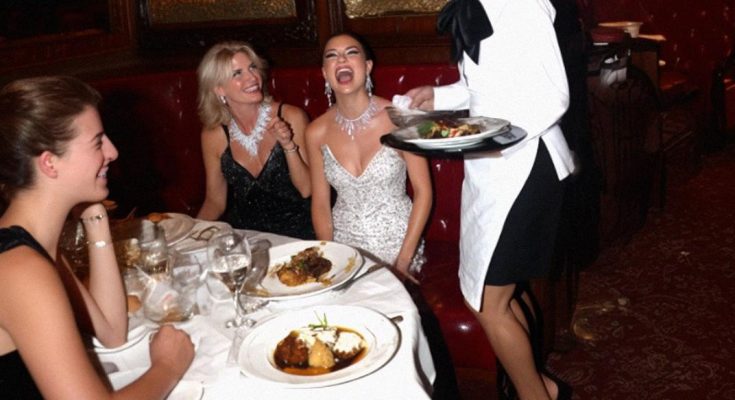Cruel words can wound in ways that leave no visible scars, but their sting lingers long after they’re spoken. I learned this one night in a restaurant, when three wealthy women mocked a hardworking waitress for “smelling poor.” The entire room froze, paralyzed by the cruelty. No one moved, no one spoke—until my boyfriend stood up and did something I’ll never forget.
My name is Anna, and this story doesn’t begin in that restaurant but in a much less glamorous place: a university library. I had been having one of those days when the universe seems to stack misfortune on top of misfortune. My coffee spilled inside my bag, soaking my notes. The bus broke down halfway to campus, forcing me to walk the rest of the way. And finally, as if fate wanted a last laugh, I found myself locked in combat with the library printer. The machine groaned, blinked, spat out half a page, then froze. Students waiting behind me sighed loudly, some rolling their eyes.
I muttered in frustration and gave the printer a light smack. That’s when a tall guy with messy brown hair stepped forward. He didn’t laugh at me like the others. Instead, he crouched down beside the machine with a calm smile. “Mind if I try?” he asked. Within seconds he pressed a couple of buttons, and the printer whirred to life, spitting out my pages as if it hadn’t just humiliated me in front of a crowd.
“Magic,” I whispered.
“Not magic,” he said. “I work in IT.”
That was how I met Jack. Over the weeks that followed, I discovered his kindness wasn’t just about fixing broken machines. He was steady in ways that mattered: showing up with pastries he knew I liked, walking me home in the rain, never making me feel foolish even when he had to rescue my laptop from yet another mistake. By the time three months had passed, he felt like someone I had known for years.
When he told me he’d made a reservation at one of the city’s fanciest restaurants, I understood what it meant. This wasn’t about chandeliers or champagne. It was his quiet way of showing me this was serious.
Dinner began perfectly. We laughed, shared stories, and enjoyed the warmth of being together. Then, halfway through dessert, the atmosphere shifted. At a nearby table, three well-dressed women were speaking loudly enough for the whole room to hear. Their laughter cut through the music, sharp and unkind.
One wrinkled her nose as the waitress approached. “God, do you smell that?” she sneered. “She smells… poor. Like someone who rides public buses.”
The second smirked. “Forget the smell. Look at her shoes—scuffed to pieces. Imagine serving in a place like this when you can’t even afford decent footwear.”
The third chuckled cruelly. “She probably lives off leftover breadsticks.”
Their laughter rang out like nails against glass. The young waitress froze, her tray trembling in her hands. Her face turned red, her lips parted as if she wanted to defend herself but the words died in her throat. The restaurant went silent. My stomach twisted with anger, but before I could speak, Jack pushed back his chair.
The scrape of wood against marble was deafening. He stood tall, calm but resolute, and walked straight toward them. His voice carried clearly. “Do you realize how cruel that sounded? She’s working, serving you, and you think mocking her makes you important? It doesn’t. It makes you small.”
The women stared at him in shock, their smug grins gone. The waitress whispered a shaky “Thank you,” her eyes wide with relief. Then something unexpected happened. A man at a nearby table rose to his feet. “He’s right. That was disgusting.” Another man stood, then another. Within moments, half the restaurant was applauding, their support echoing against the chandeliers.
The color drained from the diamond-draped woman’s face. She looked around for someone to back her up, but no one did. The manager appeared, demanding to know what was happening. Jack gestured calmly toward the women. “These three thought it was acceptable to humiliate your waitress in front of everyone.”
The women protested, insisting they were regulars, that they spent good money here. Jack’s voice cut through their excuses. “No amount of money gives you the right to treat another human being like garbage. Not here. Not anywhere.”
The manager’s face hardened. “Ladies, I am going to ask you to leave. Your meals are on the house because I don’t want your money. And let me be clear: you are not welcome here again.”
The gasps were audible. The women’s power evaporated in an instant. Clutching their handbags, they stormed toward the exit, their heels clattering against the marble floor. The heavy doors closed behind them, and the restaurant seemed to exhale.
Jack returned to our table, slipping back into his seat as though he’d done nothing extraordinary. My heart was pounding so hard it hurt. Then he leaned toward me and whispered, “I’m going to make sure she doesn’t lose her job over this.”
He spoke quietly with the manager, and I watched as the waitress’s tense shoulders finally relaxed. When Jack came back, he said simply, “She’s safe. She isn’t losing her job. He knows she did nothing wrong.”
In that moment, pride and love swelled in me so powerfully I could barely breathe. Jack hadn’t just stood up to cruelty. He had ensured kindness carried through to the end.
Under the soft golden lights of that restaurant, I realized I was sitting across from someone extraordinary. Someone whose quiet strength made the world a little better, one moment at a time. That night, I didn’t just fall deeper in love—I understood exactly what kind of man I had by my side.



